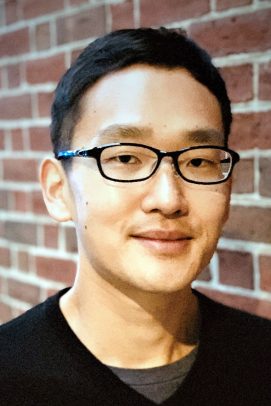UIC researcher wins McKnight Award for neuroscience innovations
To examine things that are very small — like neurons and synapses in the brain — researchers use powerful microscopes. But there is another approach that can yield impressive results: expanding a tissue sample with a special “swellable” hydrogel through a process called expansion microscopy.
“The hydrogel binds to different molecular components of cells and expands, ideally holding all the component parts in the same relative position to one another, creating a larger and more accessible sample to study — in principle, similar to writing on a balloon, then inflating it,” said Ruixuan Gao, assistant professor of chemistry and biological sciences at the University of Illinois Chicago.
Gao is one of three researchers recently selected to receive funding from the McKnight Endowment Fund for Neuroscience, which is especially interested in work that takes new approaches to advance the ability to manipulate and analyze brain function.
Based on his project’s “ability to fundamentally change the way neuroscience research is conducted,” Gao was selected for a two-year, $200,000 grant via the 2022 McKnight Technological Innovations in Neuroscience Award. He will lead a project to chemically engineer a new type of hydrogel for use in a new practice of expansion microscopy, essentially expanding tissue samples and their component cells to many times their original size to make them easier to study.
According to Gao, the new “tetra-gel” and specialized molecules that anchor the sample to the gel will allow it to expand with high fidelity and remain stable so that the molecular profile of brain tissue can be better captured.
“I am extremely grateful to the McKnight Endowment Fund for Neuroscience and the McKnight Foundation for supporting our effort to develop new and accessible imaging technologies for neuroscience and neuropathology research,” he said.
Gao’s UIC lab specializes in developing biochemical and bioimaging tools that map and track biomolecules, such as proteins, RNAs and lipids, at their natural spatial and temporal scale. His research group uses these tools to study biological structures and processes central to life and human health, including synaptic ultrastructure, long-range neuronal connection and pathological effect of misfolded proteins in the brain.
Earlier this year, he became the second UIC scholar, and the first in 35 years, to receive an award through the Searle Scholars Program, which supports groundbreaking research in chemistry and the biomedical sciences.
Since the McKnight Technological Innovations in Neuroscience Award was established in 1999, the McKnight Endowment Fund for Neuroscience has contributed more than $16 million to innovative technologies for neuroscience through this award. Technologies developed with McKnight support must ultimately be made available to other scientists.

